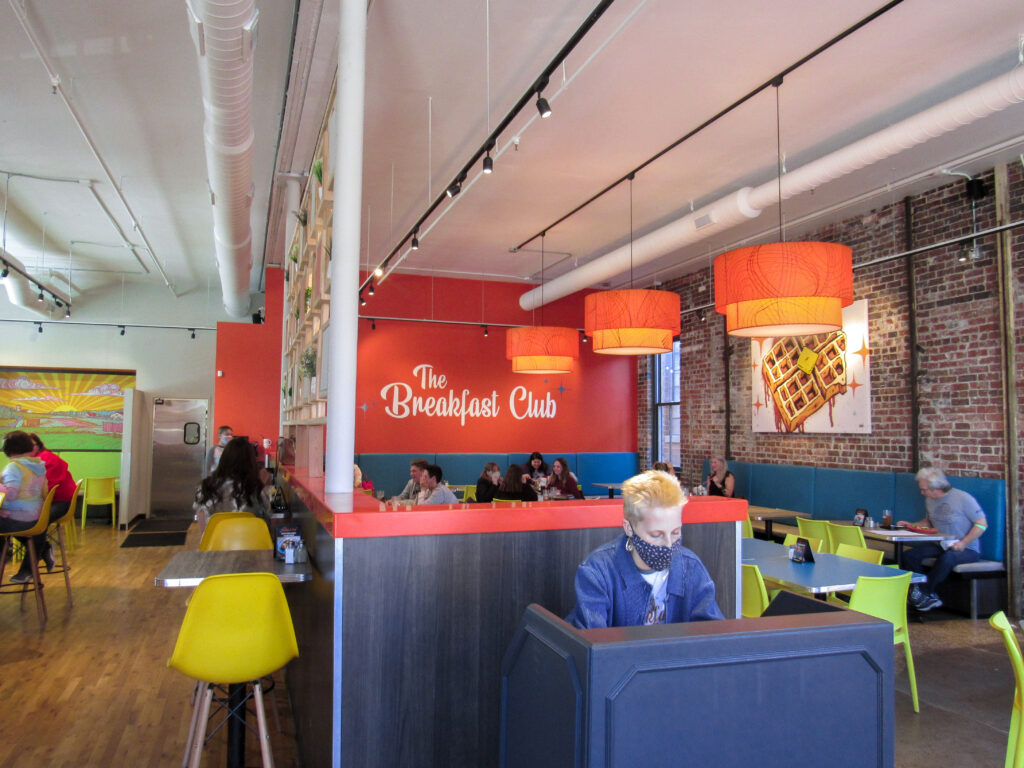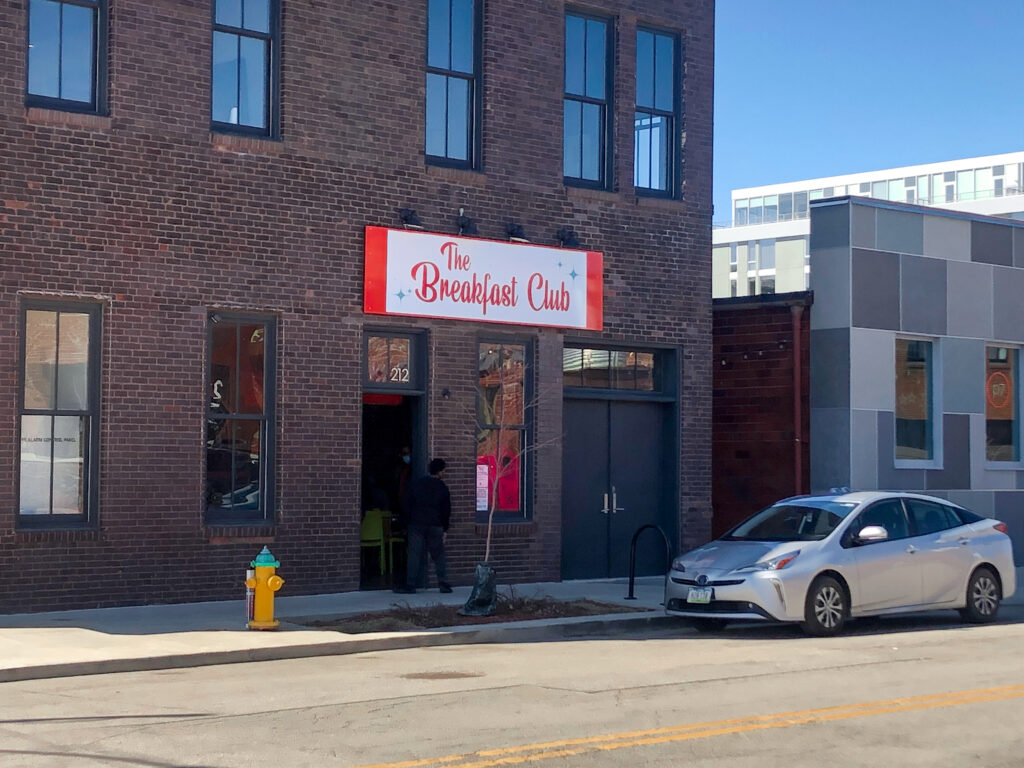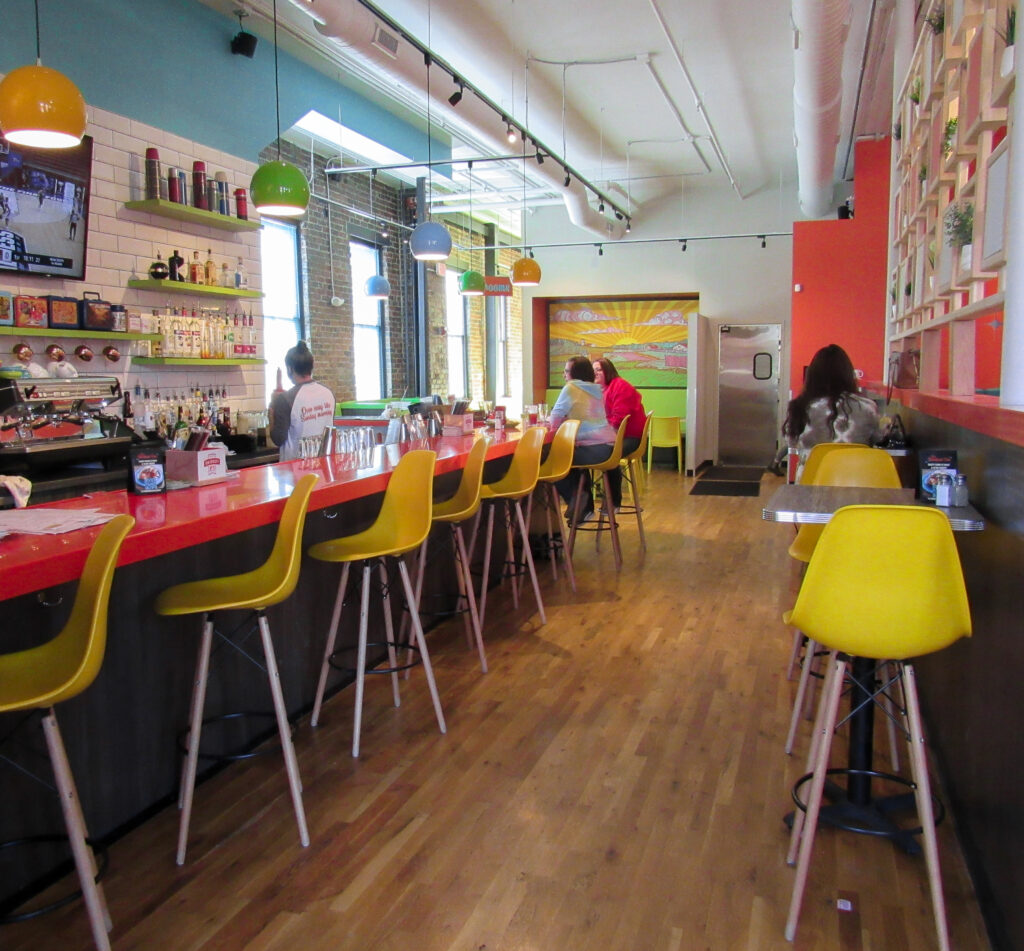Joe McConville, a Des Moines local and restaurateur, felt the city was missing something from its culinary repertoire of restaurants––a boozy breakfast-only destination.
“We just felt downtown could use a breakfast place that really just focused on breakfast…where you could come in early for business but then on the weekends, if you wanted to, get after it and have fun and bring friends,” McConville says.
Thus, the restaurant born out of this often neglected need to feed oneself a little more than an iron enriched wheat cereal, is The Breakfast Club. No, not the popular 1980s’ movie. This Breakfast Club brings retro comic book vibes to Des Moines’ East Village, serving boozy beverages and classic breakfast staples with a twist.
Think breakfast corn dogs, made with a maple butter batter and drizzled with sticky sweet syrup. Or bayou-inspired shrimp and grits, seasoned with warm cajun spices, topped with a fried egg, and served with gumbo sauce. Drooling yet? They also offer a plethora of alcoholic beverages and cocktails from spicy bloody’s to an espresso martini that is sure to beat that morning cup of coffee. Let’s be honest, “brunch without booze is just…breakfast.” Or at least that’s what it says on their website.
McConville is one of seven owners of The Breakfast Club; Tony Lemmo, Tom and Annie Baldwin, Josh Holderness, Ted Hawley and Tommy Bomstad all have a hand in the businesses. Individually, they also own other restaurants around Des Moines such as Gusto’s Pizza, Beer Can Alley, 1908 Draught House and good ol’ Peggy’s Tavern. Yeah, you know the one.
As other restaurants were closing due to the pandemic’s economic strain, they navigated The Breakfast Club’s construction and opening during one of the worst financial periods for the industry. “Everyone has their greasy spoon favorites, and we’ll still continue to love those, but this offers a more contemporary take on those traditional breakfast items,” Holderness says in DSM Magazine.
Pivoting
Originally, Tom and Annie Baldwin, managing partners at Dark Side of the Spoon Hospitality Group, and Ted Hawley and Tommy Bornstad with Alpha Ventures Group, were planning to open up what would become The Breakfast Club. It was later into its ideation that they decided to bring in McConville and Holderness due to their previous restaurant experience in Des Moines.
The Baldwins and Bornstad had picked a vacant commercial space available in downtown’s East Village––right across the street from the well-known bakery, Molly’s Cupcakes. Having previously been used as a restaurant space for Dumpling Darling, it would make construction easier during development. For McConville and Holderness, it was conveniently the same space they had talked about potentially using to open a seperate breakfast joint with a similar vibe.
“That was kind of a fortuitous thing,” McConville says.
The group had been scheduled to open an Italian restaurant together in West Des Moines before the breakfast space––but McConville and the other owners all decided to switch gears and open up The Breakfast Club instead when the pandemic first hit in March of 2020.
“It seemed like, of the restaurants that were doing well, it was breakfast and lunch places because people were more comfortable going out during the day,” McConville says.
Still, uncertainty remained. As things got worse with the pandemic and more restaurants were shutting down due to the economic strain, the group had decisions to make about whether or not this was going to be a good investment. For McConville and his partners, the most important question was safety. Were they going to be able to keep their employees and customers safe in light of all that was happening? Believing in their abilities to run a “good and honest business,” McConville says, and having a local connection to the city, they decided to keep pursuing the restaurant.
“Luckily, we’re an industry of very creative people,” McConville says.

And it’s true. Restaurants have had to completely rethink the way they serve their customers in order to slow down the virus and continue to survive. They’ve had to bulk up their take-out capabilities, partner with third-party delivery systems, and jump on the QR code train for a hands-off menu experience.
Not to mention having to completely close their doors for two weeks at the beginning of the pandemic. Most restaurants only had 16 days worth of cash on hand says Jessica Dunker, President and CEO of the Iowa Restaurant Association (IRA). With further shutdowns after that, the industry started seeing businesses close left and right, turning rural areas into food deserts. Restaurants had to learn to virtualize themselves when their very existence is built on being a gathering place for people.
Dunker says that using the closing of restaurants as a mitigation strategy hurt the industry’s consumer confidence moving forward. It’s made it harder for restaurants to reassure their customers of their safety.
“When we’re doing these COVID protocols, we’re doing far more to keep people safe than anyone’s doing in a private home,” Dunker says.
McConville says he’s even felt villainized for wanting to keep his restaurants open. With slight frustration in his voice, he parallels Dunker in saying that safety has always been a priority in the restaurant industry.
“We’re trained in how to stop viruses, for norovirus, different food-borne illnesses, we had that basis,” McConville says.
Restaurants have to uphold a certain level of sanitation and cleanliness in order to operate. Specific food regulations and processes can vary from state to state, but all food service locations need to acquire a license. In order to receive this license, these establishments must meet certain minimum sanitation and food safety requirements set by the FDA and any state specific regulations.
In addition to these pre-pandemic regulations, McConville and his partners did what they could during the planning stages to create a system that was going to keep their employees and customers safe. Bumping up sanitizing, requiring masks, and transitioning to new cleaners that have been proven to kill the virus are only a few changes they’ve adopted. McConville emphasizes that those who work in the service industry love being able to have those in-person interactions with their customers. So, whatever they need to do to keep it that way is worth it.
“We’re in this business because we like to take care of people,” McConville says.

Welcome to the Breakfast Club
“We wanted it to be fun, we wanted it to be energetic. Bright colors. The type of place you walk into and you may still be a little bit sleepy and drowsy and you walk in and you’re like ‘Alright, I’m ready to start my day, I’m ready to get after it,’” McConville says.
Ironically, on their opening day, Governor Kim Renolds lifted the mask mandate in Iowa. For The Breakfast Club, there was never the question of whether or not to keep wearing masks. It’s what keeps their employees and customers safe.
“We’re just going to keep doing what we’re doing…until someone blows the all clear sign,” McConville says.
Their first week of business was what every restaurant owner wants to see––busy. McConville says they had to start turning people away in order to keep with the COVID-19 guidelines put in place by the Center for Disease Control (CDC). Their quirky cocktails and delicious food have enticed locals to shed the sweats they’ve been wearing since the pandemic started and break out the leggings. Baby steps.
Either way, many of their customers are choosing to dine-in. Higher volumes of people means more crowds and less space to socially distance. As a result, waiting times have been longer for customers to prevent people from standing around.
“I’m not going to lie, it’s been very hard to keep it controlled, but we’re doing our best to keep people spaced and masked and part of that is it’s harder for people to get in,” McConville says.
Just a month after their grand opening, The Breakfast Club was experiencing high traffic and no signs of it stopping. McConville sees this as an extension of the typical “honeymoon period” newly opened restaurants often have. He believes that because so many have had to be turned away, there are still a lot of people who haven’t been in to eat yet.
“You’re not turning and burning like you normally would,” McConville says.
He sees the opening of The Breakfast Club as that first step for the community and a place for people to get out of the house to just enjoy some good food.
“We aren’t at a return to normalcy yet, but it’s that first step back that we can offer people,” McConville says.

What's Next
For many cities and towns, restaurants are an integrated part of their local community and economy. The Biden Administration even passed a $29 billion Restaurant Revitalization Fund as a part of the America’s Rescue Plan Act for qualifying small business restaurants––targeting those who were hurt the most.
The restaurant industry is also a big provider of entry-level jobs with 1 in 3 people in Iowa having worked in a restaurant as their first job, Dunker says. It’s an industry that opens the door and teaches skills to those just joining the workforce while giving people who’ve had a rough go-around a second chance. They are an integral part of the community and it’s going to take the support of everyone to help them survive in these next years, Dunker says.
For McConville, his biggest goal for the restaurant is to keep things consistent. Staying away from the dreaded phrase of “It used to be good but…” that causes restaurants to fall out of popularity. Customers can also look forward to a new patio that will offer more open-air seating at the restaurant as the weather warms up.
“I want it to be better tomorrow than it was today and I want to do better next week than it was this week and I want the experience to continue to get as good as we can make it,” McConville says.
While The Breakfast Club has been able to successfully open their business during the pandemic, Dunker says it’s best for those who have not had previous restaurant experience to wait. Restaurateurs like McConville and his partners have weathered previous storms and can rely on their connections and resources to cut costs.
However, among those who do have the experience, Dunker is seeing more restaurants opening in urban areas as vaccines roll out, weather warms, and business picks up. For McConville and The Breakfast Club, a new patio and the summer season could mean even busier weekends as people come out of their hibernation. For now, the restaurant is still enjoying busy weekends full of hungry people and is taking it one day at a time.
The Breakfast Club is located at 212 East 3rd Street, Des Moines, Iowa and is open from 6:00am to 2:30pm.

Can’t wait to get a reservation when we are in town in May!